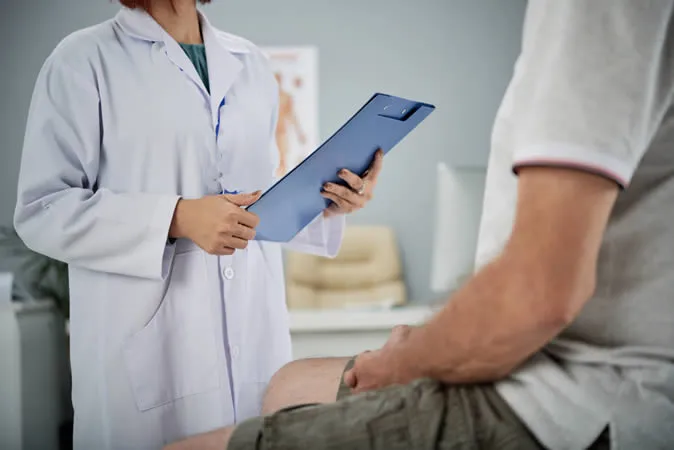What are Flea Bites?
Flea bites are small, red bumps on your skin that are caused by fleas feeding on your blood. Fleas are tiny, wingless insects that can transmit diseases and cause infections or allergic reactions.

What are the signs and symptoms of Flea Bites?
The signs and symptoms of flea bites are:
- Small, red bumps on the skin that are very itchy and may appear in clusters or lines.
- A discolored ring around the bite.
- More severe symptoms can include:
- An allergic reaction (hives, rash, shortness of breath and swelling).
- Infection of a disease carried by a flea (fever, headache, body aches, rashes, nausea, abdominal pain, weight loss, dizziness and weakness can accompany various diseases).
- Bacterial infections that cause redness, warmth, pus or fever.
- Blistering or crusting of the skin.
What are the causes of Flea Bites?
The causes of flea bites are fleas, which are tiny, wingless insects that feed on blood and have strong claws and mouthparts. Fleas can get into your home by hitching a ride on your pets or other animals that come near your yard. Fleas can also crawl in through your shoes, clothing or luggage. Fleas bite humans when they are hungry and cannot find a more suitable host, such as a dog or a cat. Fleas can transmit diseases and cause infections or allergic reactions through their bites.
What treatments are available at the dermatologist for Flea Bites?
The treatments available at the dermatologist for flea bites may include:
- Oral antihistamines to reduce the allergic symptoms of hives, swelling and itch.
- Topical creams or ointments that contain antihistamines, corticosteroids or antibiotics to help reduce itching, inflammation and infection.
- Steroid injections or oral steroids to treat severe allergic reactions or inflammation.
- Antibiotics to treat bacterial infections that may result from scratching the bites or having an underlying disease transmitted by fleas.
- Immunotherapy to desensitize the immune system to flea allergens and prevent future reactions.

What are the possible complications of Flea Bites?
The possible complications of flea bites are:
- Bacterial infections that cause redness, warmth, pus or fever.
- Allergic reactions that cause hives, wheezing, difficulty breathing or anaphylaxis.
- Diseases that are transmitted by fleas, such as plague, typhus or cat scratch fever.
- Inflammatory reactions such as tungiasis, which occurs when tropical sand fleas burrow into the skin and cause inflammation, papules and secondary skin infections.
FAQ About Flea Bites
What do flea bites look like?
Flea bites look like small, red bumps in clusters of three or four or a straight line. The bumps remain small, unlike mosquito bites. You might notice a red “halo” around the bite center. The most common places to find these bites are around the legs or ankles.
How can you spot fleas in your home?
You can spot fleas in your home by looking for small, dark specks that move or jump on your pets, furniture or bedding. You can also look for tiny, white eggs or cocoons that are attached to your pets’ fur or hidden in cracks or crevices.
How can you diagnose flea bites?
You can diagnose flea bites by examining your skin and looking for the characteristic signs of flea bites, such as small, red bumps in clusters or lines with a red dot in the center. You can also check your pets and your home for signs of fleas, such as specks, eggs, cocoons or droppings. You may also need to see a doctor if you have severe symptoms or signs of infection or disease from flea bites.
Is there a dermatologist near me in Philadelphia that offers treatment for Flea Bites?
Yes. At our Philadelphia dermatology office we offer treatment for Flea Bites to patients from Philadelphia and the surrounding area. Contact our office today to schedule an appointment.

